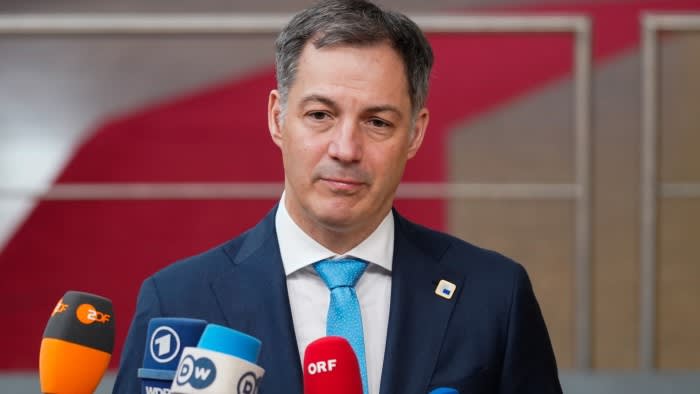Unlock the Editor’s Digest for free
Roula Khalaf, Editor of the FT, selects her favourite stories in this weekly newsletter.
Russia has paid members of the European parliament to peddle Kremlin propaganda and help more pro-Russian politicians get elected in June, according to the Belgian prime minister.
Alexander De Croo told journalists on Friday that Belgian prosecutors have launched a probe into a cash payment scheme targeting politicians across Europe, including in the Brussels-based EU parliament.
“The investigation shows that Moscow has approached and also paid European members of parliament in order to promote the Russian agenda,” said De Croo.
Russia intended to pack the parliament with sympathetic lawmakers in upcoming bloc-wide elections in June, he said.
“The objective is to help elect more pro-Russian candidates to the European parliament and to reinforce a certain pro-Russian narrative, in that institution. The goal is very clear. Weakened European support for Ukraine serves Russia on the battlefield.”
He added that Belgian intelligence had worked with the Czech government, which last month imposed sanctions on an oligarch close to Russian President Vladimir Putin for running a Russian influence operation via a Prague-based media outlet called Voice of Europe. The website, which has since been taken down, denied the allegations.
“Belgian intelligence services have confirmed the existence of pro-Russian interference networks with activities in several European countries and also here in Belgium,” said De Croo.
The Czech government in March imposed a travel ban and an assets freeze on Ukrainian oligarch Viktor Medvedchuk, who is godfather to one of Putin’s daughters. Prague has said it is lobbying for the EU as a whole to impose sanctions on Medvedchuk.
Czech deputy prime minister Ivan Bartoš told the Financial Times he was “proud” of the actions his government had taken.
But he warned: “We know there are Russian influence operations all over the world. We found one piece.”
German intelligence has confirmed the existence of influence networks while in Poland police have seized tens of thousands of euros in cash.
Polish authorities recently searched the apartment of a person in whose name Voice of Europe may have been registered and who is also suspected of spreading anti-Ukraine information online.
Prague has said that Voice of Europe paid MEPs and others to parrot pro-Kremlin talking points on the channel. The lawmakers who appeared on the channel espousing anti-Ukraine views and who are mostly members of far right parties have denied accepting money.
Polls report rising support for the populist and far right parties in elections between June 6 and 9, including France’s Rassemblement National of former presidential candidate Marine Le Pen and Alternative for Germany (AfD).
German authorities have launched a “preliminary investigation” into an AfD member, Petr Bystron, who was named in Czech media as one of the politicians who took Russian cash. Bystron has denied the accusations and the party has so far kept his name as one of the top candidates for the EU elections.
De Croo said he was confident the Russian operation would not succeed. “Our European citizens will not be fooled by Russian propaganda.”
Belgium last week passed a new law to criminalise foreign interference in the political process. The move comes after Qatar and Morocco in 2022 were accused of bribing MEPs via a former lawmaker turned lobbyist. The two countries deny any wrongdoing and the case has yet to be sent to trial.
De Croo said the EU needed new powers to fight the “Russian menace in our midst” and that European law enforcement institutions must be strengthened.
“We are in a new reality and we need to adapt to that new reality.”
Additional reporting by Raphael Minder in Warsaw

Emily Foster is a globe-trotting journalist based in the UK. Her articles offer readers a global perspective on international events, exploring complex geopolitical issues and providing a nuanced view of the world’s most pressing challenges.








